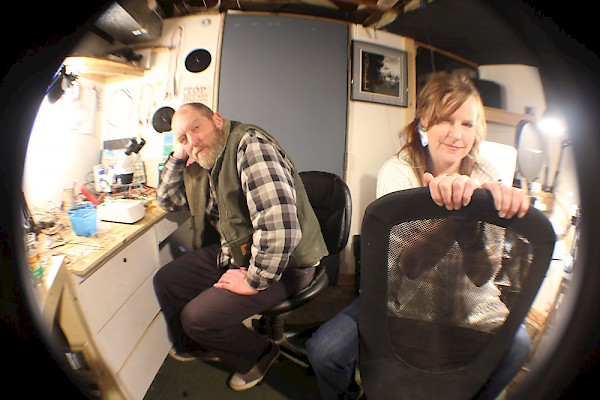 David Freel and Jennifer Dawson of Vinyl On Demand and Super Specific VinylSometimes you go global before you go local.
David Freel and Jennifer Dawson of Vinyl On Demand and Super Specific VinylSometimes you go global before you go local.
When David Freel started using a lathe to cut vinyl records of his band’s music, he was mostly shipping records to fans in Europe. Today, however, he produces vinyl records for artists and customers all over the country and plans to open a physical location in Portland.
He first started making lathe-cut reissues for his band, San Francisco post-punk rockers Swell, because he knew there was a demand for his music on vinyl. But, Freel didn’t want to pay for the usual minimum order of 500 copies or more from a record pressing company.
“I realized that it would be possible to sell my own records on demand—when I sell one, I cut one—if I had a lathe,” he recalls. “This made more sense to me, plus I really like machines.”
However, he still had to go through the long, frustrating, trial-and-error process of learning to use a lathe.
“After about two years and a ton of frustration and blown discs, I started to get it figured out, and my cuts started to sound really good,” Freel says. “At this point [now four years later], everything is working very well.”
 Swell in the '90sWhile he became successful in supplying fans of Swell with high-quality vinyl recordings, he had no idea this pragmatic way of printing his own back catalogue would turn into a service for a larger network of artists and music enthusiasts. That service is now called Vinyl On Demand.
Swell in the '90sWhile he became successful in supplying fans of Swell with high-quality vinyl recordings, he had no idea this pragmatic way of printing his own back catalogue would turn into a service for a larger network of artists and music enthusiasts. That service is now called Vinyl On Demand.
“He was able to supply vinyl directly to his fans, and it didn’t seem like a big deal to him,” co-owner Jennifer Dawson recalls. “I was like, ‘You’re the luckiest guy in the world. Do you know how many musicians would kill to be in control of their music, and their catalogue, and be in direct contact with their fans?’”
Once Freel realized this DIY medium could be useful for other musicians, he launched Vinyl On Demand with Dawson. They started to offer small runs of vinyl batches to local recording artists, bands and record labels. Like Freel, these artists can now use this service to produce however many records are in demand at any given moment.
“They can offer their fans vinyl on demand,” Dawson explains.
One custom seven-inch should run you about $25 while 20 might cost around $15 per record ($300 total). As for 12-inchers, $40 is the low end for a single record while 20 will cost $400 to $555 (minimum $20 per record). While the business currently operates and ships orders out of their workshop in Oregon City, the duo wants to create a service with a physical, local presence—and not just for musicians, but for the public at large.
With a newly upgraded lathe featuring a diamond-tipped needle, Dawson and Freel now offer online services to anyone who owns music, giving customers a chance to get copies of their favorite tunes on customized vinyl. This new service, Super Specific Vinyl, turns personally curated mixtapes into seven- and 12-inch vinyl records.
Whether it’s a personal playlist or a greatest hits collection of songs that a customer owns, SSV will lay out any tracks onto black (or clear), precision-cut vinyl. Unlike other lathe-made records, Freel cuts music on to vinyl rather than materials that wear down faster like plastic. He also makes the records with a stereo signal rather than a mono signal, which is more common.
Freel cuts the vinyl in real time, so a 40-minute-long album will take about an hour to complete. Remember, each record is being cut, not pressed. Following a recent crowdfunding campaign, Dawson says SSV is looking to establish a brick-and-mortar presence. Customers will eventually be able to drop in, curate a playlist, and leave with a record.
“We want Super Specific Vinyl to be a physical experience, in the real world, as much as it is an online experience,” Dawson says. “We don’t want to miss the opportunity of developing this as a local business.”








